EU Citizen Privacy Rights Under GDPR: Controller Duties & US Liaison
VerifiedAdded on 2023/04/08
|9
|1697
|445
Report
AI Summary
This report examines the right to privacy for EU citizens, focusing on the role of the EU member state controller in protecting personal data under GDPR. It details the controller's responsibilities, including enforcing privacy laws, ensuring data quality, and regulating data flow. The report also addresses communication methods between the controller and US investigators for coordinating case forensics discovery, highlighting the importance of secure platforms and encryption. Furthermore, it discusses the challenges posed by language differences in digital investigations and potential mitigation strategies, such as using language processors. The report concludes by emphasizing the importance of maintaining privacy rights for EU citizens and the effectiveness of the EU controller.
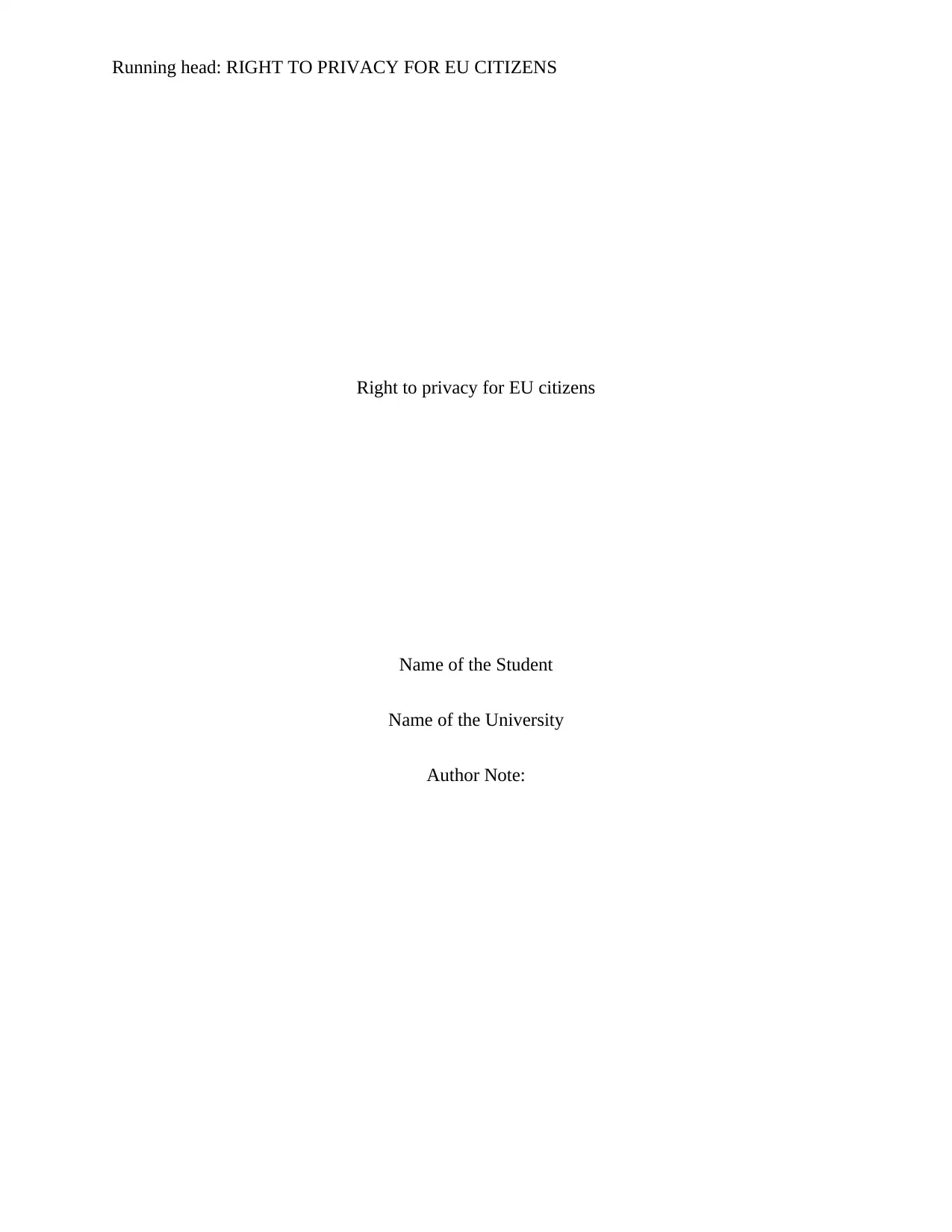
Running head: RIGHT TO PRIVACY FOR EU CITIZENS
Right to privacy for EU citizens
Name of the Student
Name of the University
Author Note:
Right to privacy for EU citizens
Name of the Student
Name of the University
Author Note:
Paraphrase This Document
Need a fresh take? Get an instant paraphrase of this document with our AI Paraphraser
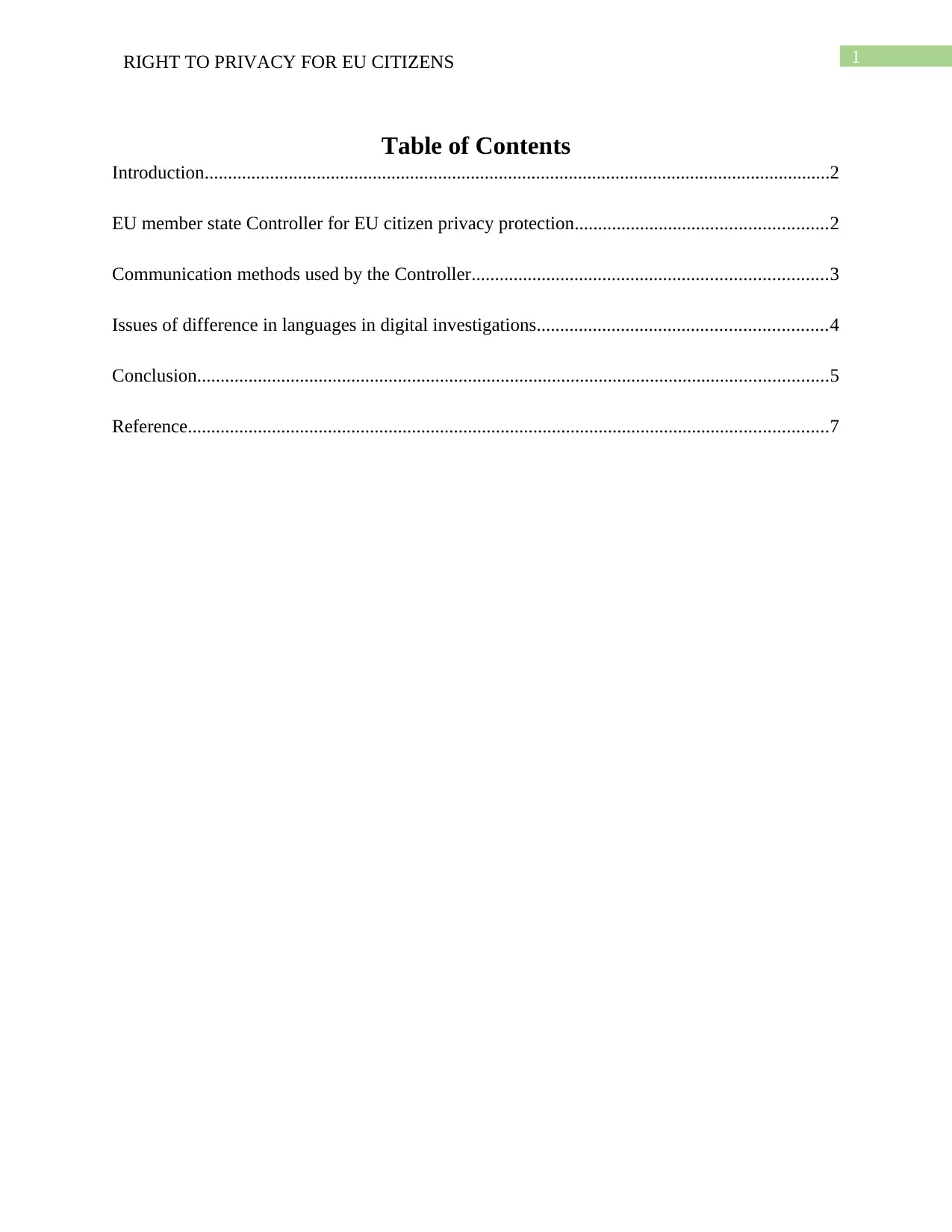
1RIGHT TO PRIVACY FOR EU CITIZENS
Table of Contents
Introduction......................................................................................................................................2
EU member state Controller for EU citizen privacy protection......................................................2
Communication methods used by the Controller............................................................................3
Issues of difference in languages in digital investigations..............................................................4
Conclusion.......................................................................................................................................5
Reference.........................................................................................................................................7
Table of Contents
Introduction......................................................................................................................................2
EU member state Controller for EU citizen privacy protection......................................................2
Communication methods used by the Controller............................................................................3
Issues of difference in languages in digital investigations..............................................................4
Conclusion.......................................................................................................................................5
Reference.........................................................................................................................................7
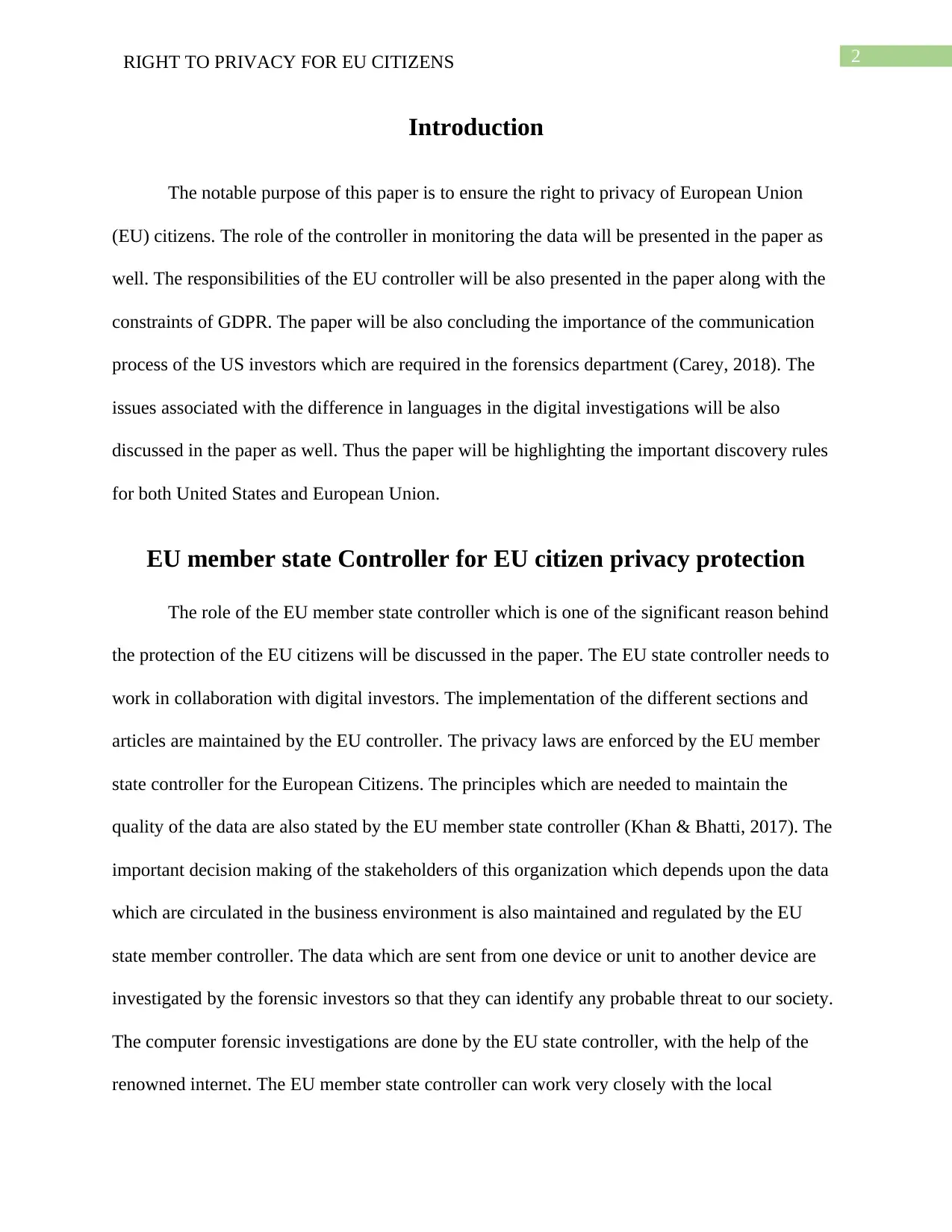
2RIGHT TO PRIVACY FOR EU CITIZENS
Introduction
The notable purpose of this paper is to ensure the right to privacy of European Union
(EU) citizens. The role of the controller in monitoring the data will be presented in the paper as
well. The responsibilities of the EU controller will be also presented in the paper along with the
constraints of GDPR. The paper will be also concluding the importance of the communication
process of the US investors which are required in the forensics department (Carey, 2018). The
issues associated with the difference in languages in the digital investigations will be also
discussed in the paper as well. Thus the paper will be highlighting the important discovery rules
for both United States and European Union.
EU member state Controller for EU citizen privacy protection
The role of the EU member state controller which is one of the significant reason behind
the protection of the EU citizens will be discussed in the paper. The EU state controller needs to
work in collaboration with digital investors. The implementation of the different sections and
articles are maintained by the EU controller. The privacy laws are enforced by the EU member
state controller for the European Citizens. The principles which are needed to maintain the
quality of the data are also stated by the EU member state controller (Khan & Bhatti, 2017). The
important decision making of the stakeholders of this organization which depends upon the data
which are circulated in the business environment is also maintained and regulated by the EU
state member controller. The data which are sent from one device or unit to another device are
investigated by the forensic investors so that they can identify any probable threat to our society.
The computer forensic investigations are done by the EU state controller, with the help of the
renowned internet. The EU member state controller can work very closely with the local
Introduction
The notable purpose of this paper is to ensure the right to privacy of European Union
(EU) citizens. The role of the controller in monitoring the data will be presented in the paper as
well. The responsibilities of the EU controller will be also presented in the paper along with the
constraints of GDPR. The paper will be also concluding the importance of the communication
process of the US investors which are required in the forensics department (Carey, 2018). The
issues associated with the difference in languages in the digital investigations will be also
discussed in the paper as well. Thus the paper will be highlighting the important discovery rules
for both United States and European Union.
EU member state Controller for EU citizen privacy protection
The role of the EU member state controller which is one of the significant reason behind
the protection of the EU citizens will be discussed in the paper. The EU state controller needs to
work in collaboration with digital investors. The implementation of the different sections and
articles are maintained by the EU controller. The privacy laws are enforced by the EU member
state controller for the European Citizens. The principles which are needed to maintain the
quality of the data are also stated by the EU member state controller (Khan & Bhatti, 2017). The
important decision making of the stakeholders of this organization which depends upon the data
which are circulated in the business environment is also maintained and regulated by the EU
state member controller. The data which are sent from one device or unit to another device are
investigated by the forensic investors so that they can identify any probable threat to our society.
The computer forensic investigations are done by the EU state controller, with the help of the
renowned internet. The EU member state controller can work very closely with the local
⊘ This is a preview!⊘
Do you want full access?
Subscribe today to unlock all pages.

Trusted by 1+ million students worldwide
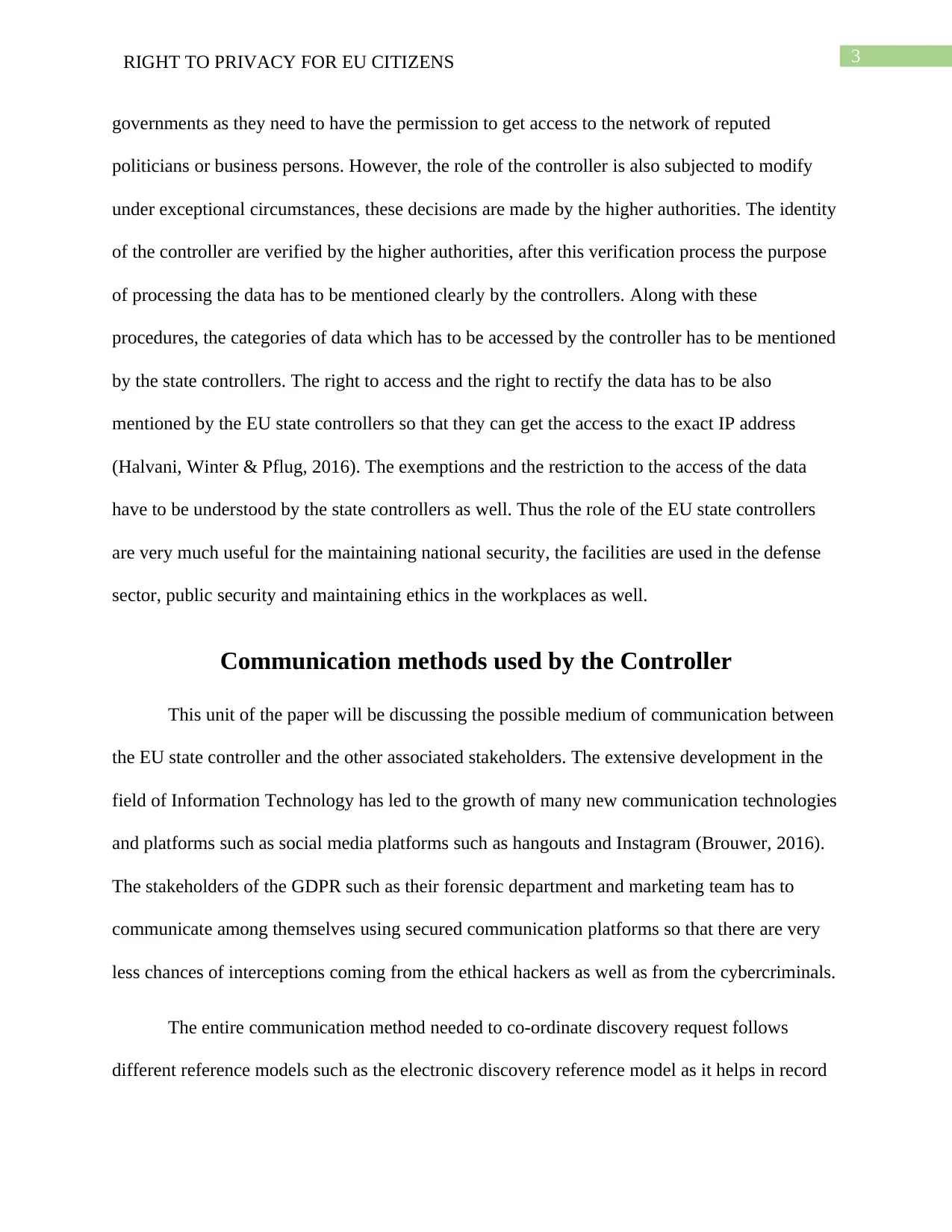
3RIGHT TO PRIVACY FOR EU CITIZENS
governments as they need to have the permission to get access to the network of reputed
politicians or business persons. However, the role of the controller is also subjected to modify
under exceptional circumstances, these decisions are made by the higher authorities. The identity
of the controller are verified by the higher authorities, after this verification process the purpose
of processing the data has to be mentioned clearly by the controllers. Along with these
procedures, the categories of data which has to be accessed by the controller has to be mentioned
by the state controllers. The right to access and the right to rectify the data has to be also
mentioned by the EU state controllers so that they can get the access to the exact IP address
(Halvani, Winter & Pflug, 2016). The exemptions and the restriction to the access of the data
have to be understood by the state controllers as well. Thus the role of the EU state controllers
are very much useful for the maintaining national security, the facilities are used in the defense
sector, public security and maintaining ethics in the workplaces as well.
Communication methods used by the Controller
This unit of the paper will be discussing the possible medium of communication between
the EU state controller and the other associated stakeholders. The extensive development in the
field of Information Technology has led to the growth of many new communication technologies
and platforms such as social media platforms such as hangouts and Instagram (Brouwer, 2016).
The stakeholders of the GDPR such as their forensic department and marketing team has to
communicate among themselves using secured communication platforms so that there are very
less chances of interceptions coming from the ethical hackers as well as from the cybercriminals.
The entire communication method needed to co-ordinate discovery request follows
different reference models such as the electronic discovery reference model as it helps in record
governments as they need to have the permission to get access to the network of reputed
politicians or business persons. However, the role of the controller is also subjected to modify
under exceptional circumstances, these decisions are made by the higher authorities. The identity
of the controller are verified by the higher authorities, after this verification process the purpose
of processing the data has to be mentioned clearly by the controllers. Along with these
procedures, the categories of data which has to be accessed by the controller has to be mentioned
by the state controllers. The right to access and the right to rectify the data has to be also
mentioned by the EU state controllers so that they can get the access to the exact IP address
(Halvani, Winter & Pflug, 2016). The exemptions and the restriction to the access of the data
have to be understood by the state controllers as well. Thus the role of the EU state controllers
are very much useful for the maintaining national security, the facilities are used in the defense
sector, public security and maintaining ethics in the workplaces as well.
Communication methods used by the Controller
This unit of the paper will be discussing the possible medium of communication between
the EU state controller and the other associated stakeholders. The extensive development in the
field of Information Technology has led to the growth of many new communication technologies
and platforms such as social media platforms such as hangouts and Instagram (Brouwer, 2016).
The stakeholders of the GDPR such as their forensic department and marketing team has to
communicate among themselves using secured communication platforms so that there are very
less chances of interceptions coming from the ethical hackers as well as from the cybercriminals.
The entire communication method needed to co-ordinate discovery request follows
different reference models such as the electronic discovery reference model as it helps in record
Paraphrase This Document
Need a fresh take? Get an instant paraphrase of this document with our AI Paraphraser
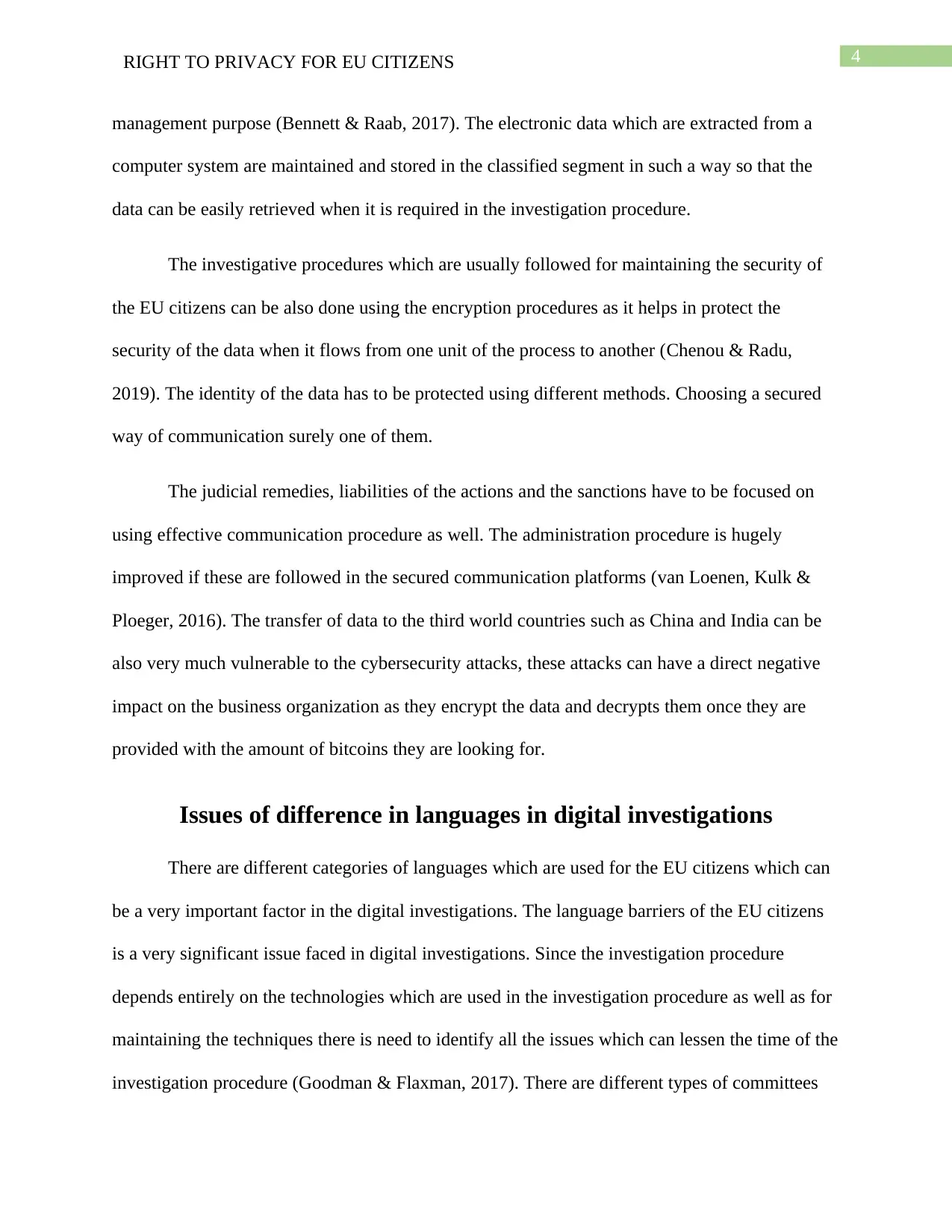
4RIGHT TO PRIVACY FOR EU CITIZENS
management purpose (Bennett & Raab, 2017). The electronic data which are extracted from a
computer system are maintained and stored in the classified segment in such a way so that the
data can be easily retrieved when it is required in the investigation procedure.
The investigative procedures which are usually followed for maintaining the security of
the EU citizens can be also done using the encryption procedures as it helps in protect the
security of the data when it flows from one unit of the process to another (Chenou & Radu,
2019). The identity of the data has to be protected using different methods. Choosing a secured
way of communication surely one of them.
The judicial remedies, liabilities of the actions and the sanctions have to be focused on
using effective communication procedure as well. The administration procedure is hugely
improved if these are followed in the secured communication platforms (van Loenen, Kulk &
Ploeger, 2016). The transfer of data to the third world countries such as China and India can be
also very much vulnerable to the cybersecurity attacks, these attacks can have a direct negative
impact on the business organization as they encrypt the data and decrypts them once they are
provided with the amount of bitcoins they are looking for.
Issues of difference in languages in digital investigations
There are different categories of languages which are used for the EU citizens which can
be a very important factor in the digital investigations. The language barriers of the EU citizens
is a very significant issue faced in digital investigations. Since the investigation procedure
depends entirely on the technologies which are used in the investigation procedure as well as for
maintaining the techniques there is need to identify all the issues which can lessen the time of the
investigation procedure (Goodman & Flaxman, 2017). There are different types of committees
management purpose (Bennett & Raab, 2017). The electronic data which are extracted from a
computer system are maintained and stored in the classified segment in such a way so that the
data can be easily retrieved when it is required in the investigation procedure.
The investigative procedures which are usually followed for maintaining the security of
the EU citizens can be also done using the encryption procedures as it helps in protect the
security of the data when it flows from one unit of the process to another (Chenou & Radu,
2019). The identity of the data has to be protected using different methods. Choosing a secured
way of communication surely one of them.
The judicial remedies, liabilities of the actions and the sanctions have to be focused on
using effective communication procedure as well. The administration procedure is hugely
improved if these are followed in the secured communication platforms (van Loenen, Kulk &
Ploeger, 2016). The transfer of data to the third world countries such as China and India can be
also very much vulnerable to the cybersecurity attacks, these attacks can have a direct negative
impact on the business organization as they encrypt the data and decrypts them once they are
provided with the amount of bitcoins they are looking for.
Issues of difference in languages in digital investigations
There are different categories of languages which are used for the EU citizens which can
be a very important factor in the digital investigations. The language barriers of the EU citizens
is a very significant issue faced in digital investigations. Since the investigation procedure
depends entirely on the technologies which are used in the investigation procedure as well as for
maintaining the techniques there is need to identify all the issues which can lessen the time of the
investigation procedure (Goodman & Flaxman, 2017). There are different types of committees
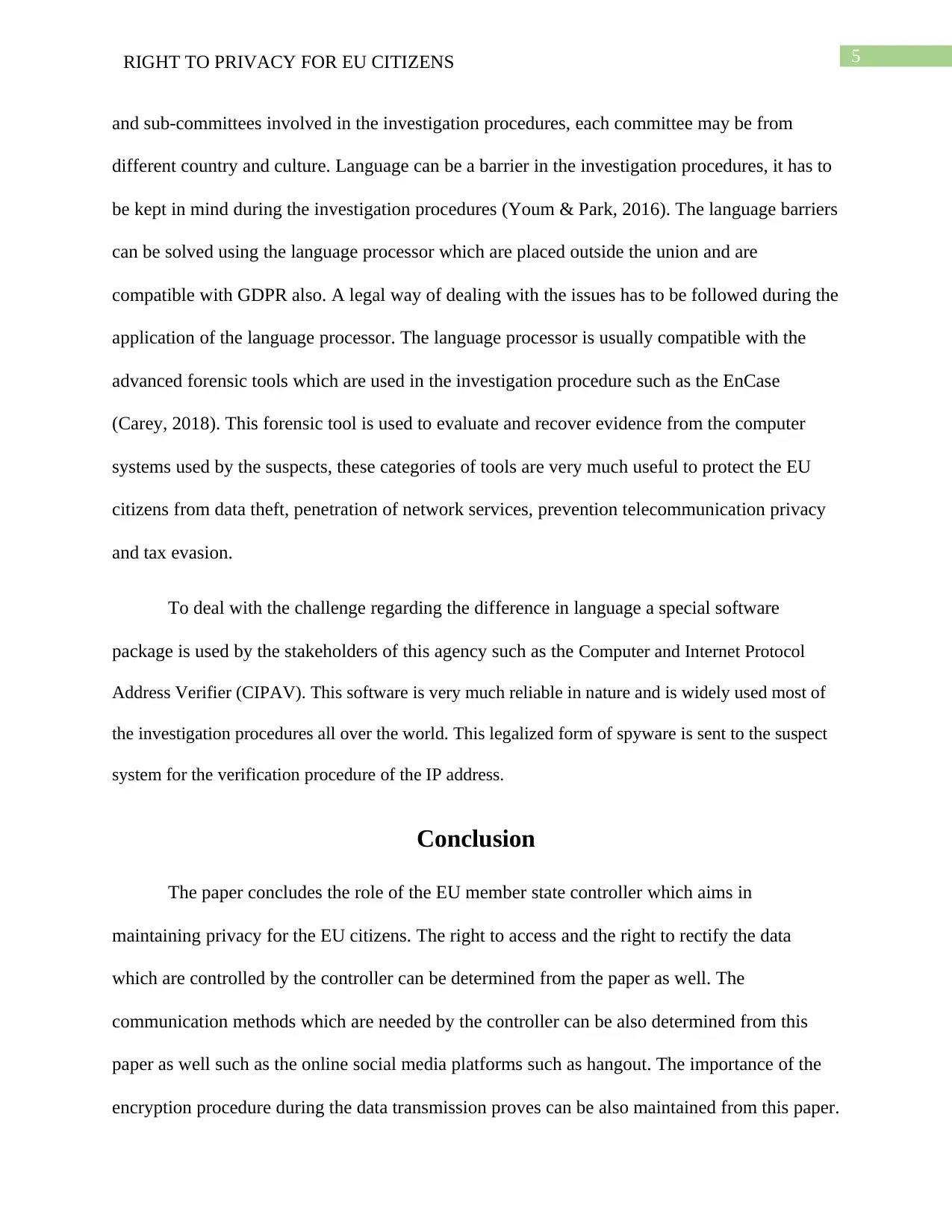
5RIGHT TO PRIVACY FOR EU CITIZENS
and sub-committees involved in the investigation procedures, each committee may be from
different country and culture. Language can be a barrier in the investigation procedures, it has to
be kept in mind during the investigation procedures (Youm & Park, 2016). The language barriers
can be solved using the language processor which are placed outside the union and are
compatible with GDPR also. A legal way of dealing with the issues has to be followed during the
application of the language processor. The language processor is usually compatible with the
advanced forensic tools which are used in the investigation procedure such as the EnCase
(Carey, 2018). This forensic tool is used to evaluate and recover evidence from the computer
systems used by the suspects, these categories of tools are very much useful to protect the EU
citizens from data theft, penetration of network services, prevention telecommunication privacy
and tax evasion.
To deal with the challenge regarding the difference in language a special software
package is used by the stakeholders of this agency such as the Computer and Internet Protocol
Address Verifier (CIPAV). This software is very much reliable in nature and is widely used most of
the investigation procedures all over the world. This legalized form of spyware is sent to the suspect
system for the verification procedure of the IP address.
Conclusion
The paper concludes the role of the EU member state controller which aims in
maintaining privacy for the EU citizens. The right to access and the right to rectify the data
which are controlled by the controller can be determined from the paper as well. The
communication methods which are needed by the controller can be also determined from this
paper as well such as the online social media platforms such as hangout. The importance of the
encryption procedure during the data transmission proves can be also maintained from this paper.
and sub-committees involved in the investigation procedures, each committee may be from
different country and culture. Language can be a barrier in the investigation procedures, it has to
be kept in mind during the investigation procedures (Youm & Park, 2016). The language barriers
can be solved using the language processor which are placed outside the union and are
compatible with GDPR also. A legal way of dealing with the issues has to be followed during the
application of the language processor. The language processor is usually compatible with the
advanced forensic tools which are used in the investigation procedure such as the EnCase
(Carey, 2018). This forensic tool is used to evaluate and recover evidence from the computer
systems used by the suspects, these categories of tools are very much useful to protect the EU
citizens from data theft, penetration of network services, prevention telecommunication privacy
and tax evasion.
To deal with the challenge regarding the difference in language a special software
package is used by the stakeholders of this agency such as the Computer and Internet Protocol
Address Verifier (CIPAV). This software is very much reliable in nature and is widely used most of
the investigation procedures all over the world. This legalized form of spyware is sent to the suspect
system for the verification procedure of the IP address.
Conclusion
The paper concludes the role of the EU member state controller which aims in
maintaining privacy for the EU citizens. The right to access and the right to rectify the data
which are controlled by the controller can be determined from the paper as well. The
communication methods which are needed by the controller can be also determined from this
paper as well such as the online social media platforms such as hangout. The importance of the
encryption procedure during the data transmission proves can be also maintained from this paper.
⊘ This is a preview!⊘
Do you want full access?
Subscribe today to unlock all pages.

Trusted by 1+ million students worldwide

6RIGHT TO PRIVACY FOR EU CITIZENS
There are few important aspects of the communication process which has to be maintained by
the controllers such as the liabilities of actions, judicial remedies and the different sanction
which has to be focused. The issues created due to the difference in language can be understood
from this paper along with its mitigation plan in terms of the software such as Computer and
Internet Protocol Address Verifier (CIPAV). Thus, the paper is very much useful to understand the
how the right to privacy has to be maintained for the EU citizens.
There are few important aspects of the communication process which has to be maintained by
the controllers such as the liabilities of actions, judicial remedies and the different sanction
which has to be focused. The issues created due to the difference in language can be understood
from this paper along with its mitigation plan in terms of the software such as Computer and
Internet Protocol Address Verifier (CIPAV). Thus, the paper is very much useful to understand the
how the right to privacy has to be maintained for the EU citizens.
Paraphrase This Document
Need a fresh take? Get an instant paraphrase of this document with our AI Paraphraser
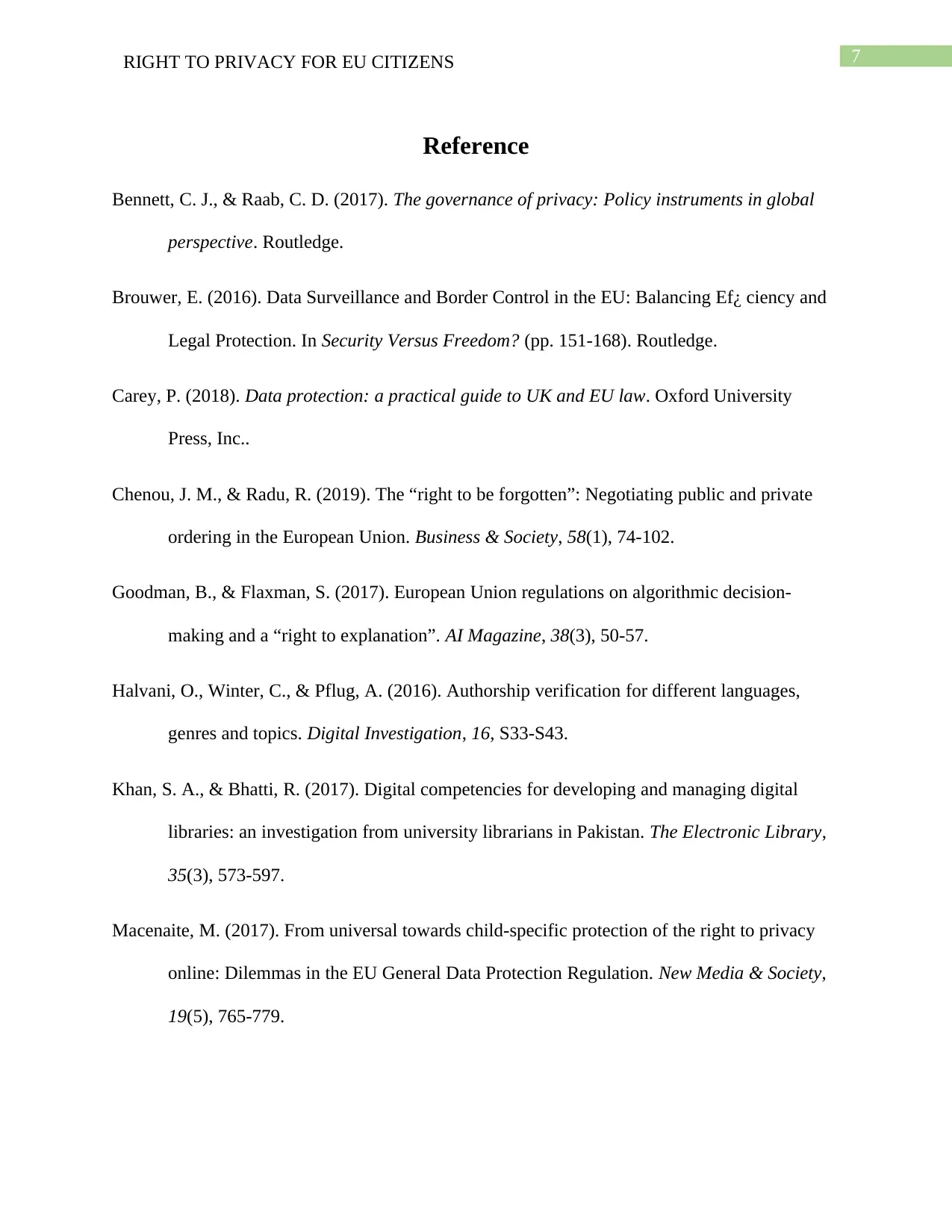
7RIGHT TO PRIVACY FOR EU CITIZENS
Reference
Bennett, C. J., & Raab, C. D. (2017). The governance of privacy: Policy instruments in global
perspective. Routledge.
Brouwer, E. (2016). Data Surveillance and Border Control in the EU: Balancing Ef¿ ciency and
Legal Protection. In Security Versus Freedom? (pp. 151-168). Routledge.
Carey, P. (2018). Data protection: a practical guide to UK and EU law. Oxford University
Press, Inc..
Chenou, J. M., & Radu, R. (2019). The “right to be forgotten”: Negotiating public and private
ordering in the European Union. Business & Society, 58(1), 74-102.
Goodman, B., & Flaxman, S. (2017). European Union regulations on algorithmic decision-
making and a “right to explanation”. AI Magazine, 38(3), 50-57.
Halvani, O., Winter, C., & Pflug, A. (2016). Authorship verification for different languages,
genres and topics. Digital Investigation, 16, S33-S43.
Khan, S. A., & Bhatti, R. (2017). Digital competencies for developing and managing digital
libraries: an investigation from university librarians in Pakistan. The Electronic Library,
35(3), 573-597.
Macenaite, M. (2017). From universal towards child-specific protection of the right to privacy
online: Dilemmas in the EU General Data Protection Regulation. New Media & Society,
19(5), 765-779.
Reference
Bennett, C. J., & Raab, C. D. (2017). The governance of privacy: Policy instruments in global
perspective. Routledge.
Brouwer, E. (2016). Data Surveillance and Border Control in the EU: Balancing Ef¿ ciency and
Legal Protection. In Security Versus Freedom? (pp. 151-168). Routledge.
Carey, P. (2018). Data protection: a practical guide to UK and EU law. Oxford University
Press, Inc..
Chenou, J. M., & Radu, R. (2019). The “right to be forgotten”: Negotiating public and private
ordering in the European Union. Business & Society, 58(1), 74-102.
Goodman, B., & Flaxman, S. (2017). European Union regulations on algorithmic decision-
making and a “right to explanation”. AI Magazine, 38(3), 50-57.
Halvani, O., Winter, C., & Pflug, A. (2016). Authorship verification for different languages,
genres and topics. Digital Investigation, 16, S33-S43.
Khan, S. A., & Bhatti, R. (2017). Digital competencies for developing and managing digital
libraries: an investigation from university librarians in Pakistan. The Electronic Library,
35(3), 573-597.
Macenaite, M. (2017). From universal towards child-specific protection of the right to privacy
online: Dilemmas in the EU General Data Protection Regulation. New Media & Society,
19(5), 765-779.
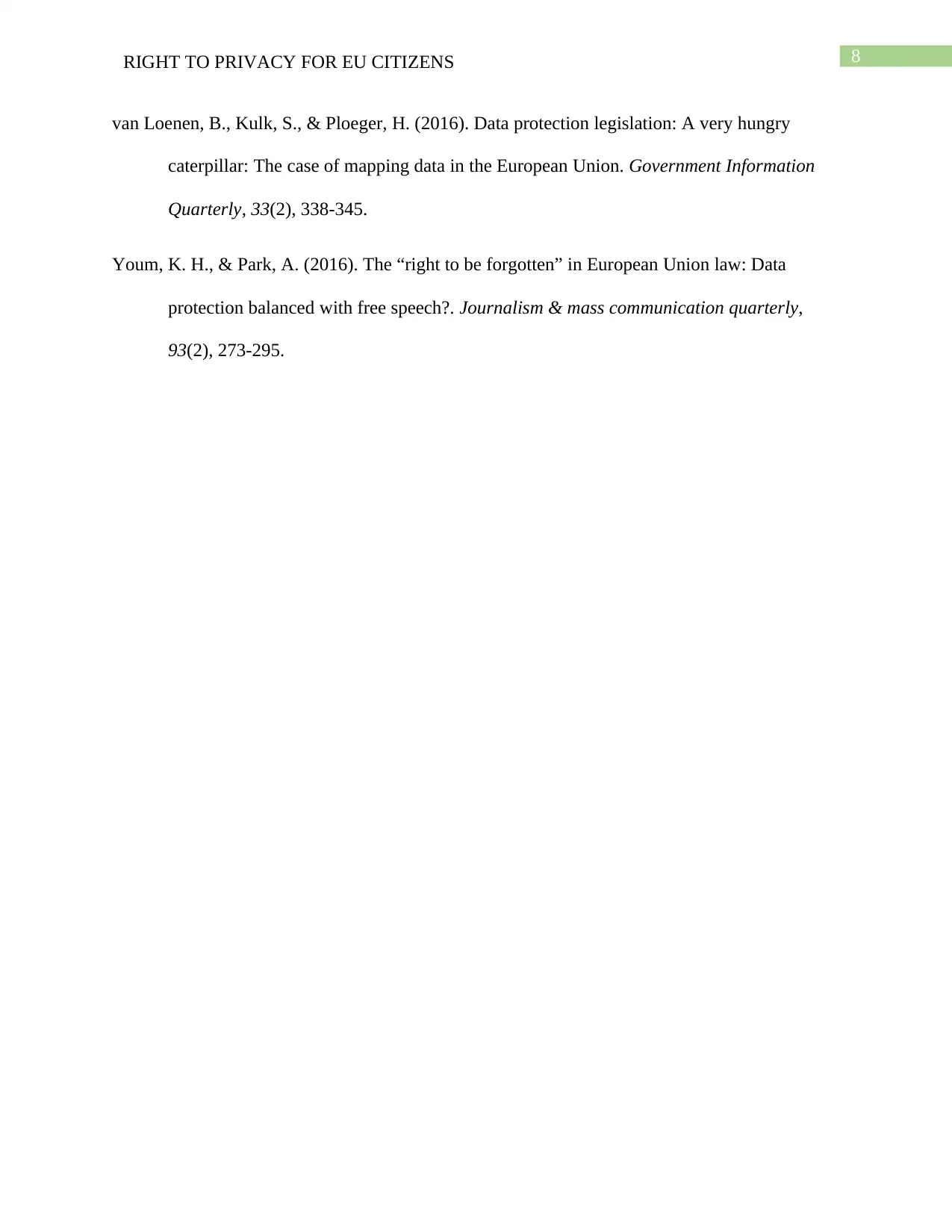
8RIGHT TO PRIVACY FOR EU CITIZENS
van Loenen, B., Kulk, S., & Ploeger, H. (2016). Data protection legislation: A very hungry
caterpillar: The case of mapping data in the European Union. Government Information
Quarterly, 33(2), 338-345.
Youm, K. H., & Park, A. (2016). The “right to be forgotten” in European Union law: Data
protection balanced with free speech?. Journalism & mass communication quarterly,
93(2), 273-295.
van Loenen, B., Kulk, S., & Ploeger, H. (2016). Data protection legislation: A very hungry
caterpillar: The case of mapping data in the European Union. Government Information
Quarterly, 33(2), 338-345.
Youm, K. H., & Park, A. (2016). The “right to be forgotten” in European Union law: Data
protection balanced with free speech?. Journalism & mass communication quarterly,
93(2), 273-295.
⊘ This is a preview!⊘
Do you want full access?
Subscribe today to unlock all pages.

Trusted by 1+ million students worldwide
1 out of 9
Related Documents
Your All-in-One AI-Powered Toolkit for Academic Success.
+13062052269
info@desklib.com
Available 24*7 on WhatsApp / Email
![[object Object]](/_next/static/media/star-bottom.7253800d.svg)
Unlock your academic potential
Copyright © 2020–2026 A2Z Services. All Rights Reserved. Developed and managed by ZUCOL.




